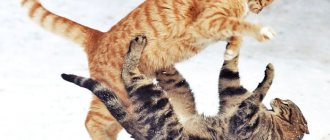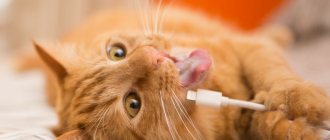An aggressive and uncontrollable cat is a big problem for all family members. For adults this is an inconvenience, for children it is a serious danger. You should not turn a blind eye to the aggressive behavior of an animal, since weaning a cat from biting is an important step in raising an obedient and affectionate pet.
Raising a cat
Indeed, very little attention is paid to raising a cat. The list of recommendations can be divided into two categories:
- sets of commands for exhibitions that have no meaning in everyday life;
- Individual training programs developed by a specific owner, which may not work in other situations and with other animals.
Despite the available training manuals, cats do not respond well to it.
Since you most likely do not plan to teach your biting pet to stand on its hind legs, training a cat is clearly not your option.
Conditioned reflex
The main method that seems most acceptable in the fight against sharp teeth of a pet is the development of a conditioned reflex in the animal. To be able to change your pet’s worldview and consolidate a negative reaction towards a certain action, you should try hard.
Corporal punishment will not develop the desired behavioral attitude in a cat.
To demonstrate the effect of a conditioned reflex, let's look at an example. The cat is tearing the wallpaper, and the owner wants to stop him. Its main task is not to influence the cat itself, but to create environmental conditions in which the pet would not want to return to its atrocities. Such an environmental condition could be water from a spray bottle, which will spray the cat as soon as he starts tearing the wallpaper.
Don't try to shame your pet in an attempt to show him that aggressive behavior is unacceptable.
Remember that you must work primarily with negative reinforcement. Negative reinforcement involves giving the cat unpleasant physiological sensations or inducing a feeling of fear in him.
It is important to develop a sense of proportion as early as possible. Physiological discomfort should not be prolonged and intense, otherwise you will ruin your pet’s psyche. A short unpleasant episode is enough to begin to rebuild the cat.
Reaction speed
Keep in mind that negative reinforcement must be timed to coincide with the crime itself. If you saw torn wallpaper half a day later and ran to spray the cat, this procedure will not lead to results. The fact is that cats have short memories. In their minds, they will not be able to connect cause and effect in a few hours, and pets will easily harbor a grudge against the treacherous spraying.
It only makes sense to catch a four-legged criminal red-handed
Positive reinforcement
Unlike dogs, positive reinforcement does not work at all on cats. Your praise of your pet's exemplary behavior or gifts in the form of treats will not bring any educational effect. However, there will be no harm from such rewards either, if you do not overfeed or overpraise your pet.
Rewards may not give the result expected by the owner
Punishment or ignoring
The choice between punishment and ignoring belongs to that category of decisions when it is difficult to choose the lesser of two evils. Both options have their downsides, which we will briefly list below.
Punishment:
- Ineffectiveness: the pet does not always understand the reason why he is being punished;
- Bitterness: Felines are known for their rancor. They will miss the reason for your punishment, and they will calculate their revenge in detail;
- Stress: Frequent punishment leads to overexertion of the cat, which cannot promote learning;
- Complications: if physical force is used during punishment, then you can inadvertently injure your pet.
Staying calm when sharp claws dig into your skin is a difficult path with unpredictable results.
Ignoring
- Ineffectiveness: since cats always consider the consequences of their actions, impunity can encourage them to commit new hooliganism;
- Bitterness: Some breeds perceive lack of attention as an insult from the owner and further aggravate their misdeeds;
- Temporary and physical losses: the owner’s feigned indifference will not help solve the problem, but it can cause very noticeable physical damage in the form of numerous abrasions.
Contrary to the owner's dreams, the cat hardly feels guilty for his actions
How to recognize readiness to bite
The animal's body language changes when ready to attack. Please note if:
– the pet’s posture has changed;
– the body is tense;
– the ears flattened and the pupils dilated;
– the purring changed to rumbling;
– the tail is raised and trembling;
Anticipating a threat, the animal can hiss even at its owner.
One sign, and especially their combination, indicates that the animal is ready to attack. Do not make sudden movements or try to deliberately calm your pet; carefully move away and leave him alone for a while.
How to understand when to take up parenting
Some owners are negligent about displays of aggression in their pets, even when they go beyond all limits. But what should a person do when everything is not so obvious? “Yes, the cat sometimes jumps out from around the corner and attacks the legs for no apparent reason, terrorizing the guests. This is the character of our furry animal.” Such an attitude, which at first seems to be a benevolent acceptance of a pet, upon closer examination turns out to be a manifestation of weakness and a subordinate position.
A biting kitten will sooner or later turn into a sharp-toothed big cat
It should be remembered that a cat is, first of all, a predator and he thinks of relationships with the inhabitants of the house in terms of hierarchy. This is especially true for uncastrated cats, which come into fighting condition in the spring. The fight for territory, for resources and for females who still do not come when called is a natural state for a cat, determined by instincts.
Therefore, if you want to see a fluffy ball next to you, consisting of tenderness and purring, then the only advice may be to buy a plush toy. Cats, like all other predators, are constantly fighting for survival, regardless of the conditions in which they find themselves. A certain amount of aggression towards the owner is normal - this is evidence that the cat is healthy and full of strength.
Unfortunately, angel cats who are ready to bring only joy to their owner have not been found in nature.
Since all cats are different, it is up to the owner to understand exactly where the pet crossed the border. There is no point in waiting for the moment when your furry pet turns into a tyrant and won’t let you take a step. In order not to resort to radical measures to calm an adult, it is advisable to educate her from a young age.
Education involves the cat’s perception of the owner’s message. The best place a person can take in relation to a cat is the place of leader of the pack. The leader must be fair and consistent, and his word, in turn, must be law.
If the cat understands in time that you are the “main” in this house, it will be easier to establish mutual understanding with him
Of course, cats are less likely to find their place in the pack compared to the same dogs. Representatives of cats are usually classified as “individualists”. However, your pet must learn that he is in a subordinate position, otherwise frequent showdowns cannot be avoided. If you manage to establish a relationship with a cat at this level, then even the most stubborn and grumpy four-legged friends will not need slippers and newspapers.
Physiological reasons
A cat does not always bite due to improper handling or the need to defend itself from a threat. There are also physiological factors that cause this behavior. A pet may bite if:
- there are pain sensations;
- feels irritated;
- protects offspring;
- is in euphoria;
- teeth are cutting through;
- there is a hormonal imbalance;
- have a serious illness.
Under the thick fur, the wound may not be noticed. But when a cat is petted, it feels pain. In this case, by biting, she tries to show the sensations she is experiencing and explains that she is unpleasant. Not all pets like prolonged stroking and touching. Even caressing them can cause irritation. A cat may bite to stop excessive pestering and excessive stroking.
The aggressive behavior of a cat when she has small kittens is understandable. Protecting offspring is a duty dictated by nature. There is no need to disturb the animal during this period if it is too jealous of its babies.
Bites are sometimes an expression of a surging feeling of great love for the owner. This behavior can be observed during stroking, affectionate words spoken to the pet. Don't be surprised if your cat bites while playing. These pets are gambling, they forget about the rules during active fun.
Little kittens often bite because their gums become itchy while teething. Cats can behave aggressively, cats after castration, sterilization, during sexual arousal. During these periods, there is a hormonal imbalance, which leads to a change in character.
Bites and attacks may be the result of infection with a serious infectious disease. The greatest danger is rabies.
It is necessary to take into account that each pet has an individual character. Aggression may be one of the personal traits. Such representatives are found both among people and among animals.
Features of the manifestation of cat aggression
The first thing a person should learn (preferably before purchasing a pet) is that cats are not aggressive by nature. They do not have the provocateur traits that are so clearly manifested, for example, in small breeds of dogs. Therefore, the reason why a cat manifests itself as an aggressor is always objective (or it seems so to the cat). His extended claws and prepared fangs are a reaction to something from the outside that the cat cannot cope with peacefully.
The cat prefers to avoid collisions and takes drastic measures only in extreme cases
Most “evil” cats who tyrannize their owners are not the inveterate villains and scoundrels that they are described as. Excessive aggression is most likely due to a misunderstanding on the part of humans of what is bothering the animal. Being constantly stressed, the cat weakens its psyche and over time can actually become inadequate, seeing danger everywhere.
The motives for aggression of even the most vicious cat are the desire to survive
If you are faced with the fact that your pet often gives vent to his teeth, then you need to observe his behavior. One aggressive episode should fit into the whole picture, except for those cases when it is an element of play behavior and aims to attract the attention of the owner.
Mistakes in handling cats
If a cat shows aggression towards strangers for no reason, rushes at them, tries to bite them, the reason most likely lies in mistakes in upbringing. This problem is often faced by owners who tried to isolate the kitten in the first months of its life. When guests or strangers arrived, the baby was locked in the room and was not allowed to meet strangers. It happens that a pet is isolated from the loud sounds of a vacuum cleaner or washing machine.
But for proper socialization, the kitten needs to thoroughly study the environment within 2-3 weeks and make sure that it does not pose a danger. Otherwise, when any unfamiliar factors appear, the kitten will become frightened, and aggression is a means of defense.
There are several other reasons for this behavior:
- assertion of your priorities;
- ingrained fears, anger;
- revenge for an insult.
Sometimes the desire of the owners to assign the “title of king” to the pet has a negative impact on the formation of the cat’s character. The pet begins to consider itself the main one in the house, with the help of bites and aggressive attacks it proves its dominance. Not every cat will behave this way; most calmly experience their most important position in the house. But if the animal has a tendency to dominate, encouraging it will create many problems.
One of the common reasons is revenge for grievances caused. A cat that has previously been abused may defend itself by biting for old times’ sake. He does not understand that no one is going to harm him, he defends himself according to the established pattern of behavior. Even your own cat can take revenge and is severely punished for any offense.
Tips for taming a kitten
Table 1. Methods for pacifying a kitten
| Method | Efficiency |
Take the kitten in your arms | A kitten's young body contains endless reserves of energy. By splashing it out, he can bite, scratch, and literally fly around the apartment. To slow down the little hunter, take him in your arms and stroke him with smooth movements. Feeling cared for and getting comfortable on the warm lap of the owner, the kitten may even suddenly fall asleep |
Play with the kitten | Give the kitten's energy the right outlet - play with it with a ball of thread or special toys. At this age, the cat will happily chase clockwork and squeaking mice and chew them. To avoid becoming a kitten's prey, provide him with a toy equivalent. Having played enough during the day, the kitten will not terrorize its owners again |
Be strict | If peaceful measures do not help, you will have to show some persistence. To subdue it, click on the kitten's nose or spray it with a spray bottle. When clicking, it is important to correctly calculate your forces so that this action is not perceived as a blow. You can take the kitten by the scruff of the neck - this was previously used by its mother, but now it is at your disposal |
Switch the kitten's attention | This advice is ineffective in terms of education, but it allows you to stop a single attack of aggression. When the kitten starts to bite, make a sharp sound. A clap of your hands, a kick to the floor - anything unexpected is suitable for redirecting your pet's attention. Metal rattling cans are ideal. The disadvantage of this method is that the kitten will quickly get used to this noise feature and stop reacting to it. |
Cover the kitten with a cloth | If you see that the kitten is playing and does not respond to requests to stop, then there is a radical method of stopping the activity. Take a thick cloth and wrap your restless pet in it. Once isolated, the kitten will become quiet. Keep in mind that by doing this you will cause stress to him, as cats do not tolerate being in such confined spaces well. |
Take proper care of your kitten | Sometimes the reason for the attacks is very simple - the kitten is hungry or wants to go to the toilet, which has not yet been cleaned since the last time. Paying attention to your pet's natural needs will help you avoid sudden outbursts of aggression and painful bites. |
Don't overuse affection | All kittens have different sensitivity thresholds. Some felines can be hugged for hours, while some cats disappear from sight even at the hint of tenderness. If you notice that your cat does not like physical manifestations of love, then moderate your ardor and calculate the dose of physical contact with the kitten, taking into account its character |
If the kitten has already attacked a part of your body you like, do not pull it back under any circumstances. This behavior, typical of prey in the animal world, can only encourage the pet to further predatory activity.
Maybe the kitten is sick?
The issue of a possible illness in a kitten deserves special attention. If you suspect that your young friend is not doing well with his health, we advise you to keep an eye on him. Indeed, aggressiveness is one of the possible manifestations of poor health. However, it alone is not enough to make a diagnosis.
Due to excessive aggressiveness, it is important to recognize the signs of the disease in time.
The following list of deviations will help you navigate the well-being of your four-legged friend:
- poor appetite or its complete absence for several days;
- frequent or excessive vomiting;
- loose stools mixed with blood or mucus;
- body temperature is too high or too low (remember that the norm for felines ranges from 37-39.5 degrees, depending on the breed);
- frequent coughing or sneezing accompanied by mucus;
- bad breath;
- limping gait, unnatural head tilt.
If you find at least one of the points described above in your kitten, you should show it to the veterinarian as soon as possible, since it is difficult for your pet’s fragile body to fight diseases alone. Timely help will help relieve pain and get rid of aggression.
Feeling unwell can cause significant changes in behavior
If your kitten has an excellent appetite, sleeps well and quickly runs around the apartment as if nothing had happened, then most likely the reasons for the aggression do not lie in pathology.
Some animals are very cunning and are able to “fake” symptoms when they see that the owner wants to achieve submission from them. This behavior is triggered when the pet is unwilling to comply with a requirement or enter into an open conflict. By pretending to be sore, the animal tries to achieve relief peacefully. Your task is to notice and stop this manipulation in time.
Is it possible to stop a kitten from scratching once and for all?
The frequent occurrence of this naive question prompts us to devote a separate chapter to it. The reasons for this desire are clear: to adapt the animal to your needs and make its existence extremely comfortable - this is the dream of many owners with problem animals.
Scratched and bitten hands are something that every owner will have to face.
There can be only one answer - you cannot somehow magically influence an animal so that it learns some kind of attitude for the rest of its life. A kitten is a living organism just like you. Changes occur in it, changes occur in everyday life (for example, the appearance of new pets or moving). No one is protected from stress, the reaction to which is sometimes unpredictable.
Raising a predator is a long and energy-intensive task, but worth taking on.
The sooner you understand that a kitten is not a program that can be rewritten as you please, the easier the further process of raising a rebellious predator will go.
What not to do in the process of education
A person can stop a kitten from scratching and biting only if he does not make common mistakes:
- You can't hit a kitten. You need to reprimand him in a stern voice and leave him alone for a while. The pet will understand that biting and scratching its owner's arms and legs is unacceptable. And physical violence will embitter the animal even more.
- Prohibitions must be observed by all family members. If the owner is trying to wean the animal from scratching and biting, and the relatives allow the baby to behave this way, you should not expect success.
- You can't provoke a kitten. It is forbidden to deliberately tease a baby and then punish him for biting and scratching. The animal will become completely confused.
- You should not play with a kitten without special devices. Toys that exclude direct contact will help to wean a kitten from biting and scratching during play: laser pointers, wind-up mice, bows on strings. You cannot use your own hands and feet. Otherwise, the baby will get used to scratching and biting.
- You cannot limit your pet's movement. For proper development, the baby must run, jump, and imitate hunting. The lack of such an opportunity and being forced to stay within four walls cause behavioral anomalies.
To wean a kitten from scratching and biting, you need to establish the reason that caused such actions. After this, you can begin raising your child before the wrong behavior becomes a habit.
Why does the cat bite?
Moving on to consider the causes of aggression in adult cats, we will see that many of them moved from the children's section to the adult section without changes. Early separation from mother and siblings, unsuccessful socialization and poor upbringing - we will not dwell on all this again. Cats scratch and bite for the same reasons kittens do. There is only one new point, which we will now get acquainted with.
Adult cats bring a lot of their behavior from childhood.
Video - Taming the Shrew Cat
Sexual hunting
Closer to spring, unpredictable metamorphoses may begin with a once calm and docile cat. These changes include:
- conspicuously ignoring the tray, marking corners
- calling cries. The pet is ready to “sing” both day and night, without knowing rest
- outbreaks of aggression towards owners. The pet gives free rein to its teeth and claws. In a word, he turns into a furry tyrant.
- Continuous attempts to run outside
The most common cause of aggression in cats is unsatisfied sexual need.
Castration
All these signs indicate the awakening of the sexual instinct, which begins to bother kittens just during the maturation period - at 8-10 months. The best option to get rid of the above features is castration. After removal of the testicles, cats usually calm down. If they continue to have relapses of sexual desire, they weaken significantly in the absence of the organ that produces male sex hormones.
You can read about how to properly prepare a cat for castration on our portal.
Castration is an effective and humane way to reduce a cat’s sex drive and calm him down.
Hormonal agents
There is an alternative option for taking hormonal pills, but it is a last resort. The effect of hormonal drugs on the body is controversial and can lead to deterioration of health and the appearance of tumors. Therefore, if you decide to take this step anyway, consult your veterinarian in advance.
How to stop a kitten from scratching
It will not be possible to stop a kitten from scratching forever. Animals use their claws when stressed or threatened, and such situations cannot be completely ruled out.
However, with the help of education, you can wean your pet from using its teeth and claws out of boredom and teach it to control its behavior. He will understand that scratching is bad and will try not to do it. Good manners should be taught as early as possible. The younger the animal, the easier it is to correct its habits.
You can stop your pet from scratching using the same methods that are used when a cat bites:
- outdoor games for physical and emotional release;
- stroking and relaxation;
- switching attention;
- ignoring;
- eliminating the irritant;
- rigor.
If a kitten has been beaten before, it does not allow itself to be petted and scratches in response to affection. In this case, there is no need to wean him off with punishment. You need to gradually establish contact, praise and encourage your pet when he allows you to touch him.
Medicines and folk remedies in the fight against aggression
Looking for an easy way, the owner can find a lot of sedatives for the pet in online and pet stores. The range of options is wide: from the familiar valerian to drops and sprays with hops and mint, which have a sedative and relaxing effect. With such variety, it is important not to get confused and choose the best option.
Table 2. Sedatives for cats
| A drug | Impact |
Valerian tincture | If possible, avoid experimenting with this infusion on a cat, especially during the period of sexual heat. Medicinal valerian has an effect on pets similar in effect to cat pheromones during estrus. As a result, we do not get a sedative, but its complete opposite. The bonus is the cat’s immediate addiction to the drug and subsequent withdrawal, which will cause additional attacks of aggression. |
Cat mint | There are many myths associated with mint about its soothing properties. In fact, it is an analogue of valerian with a less pronounced effect. Its effect is inconsistent and unpredictable - for some cats, mint has no effect at all. Available in dried and spray form |
Stop stress for cats | According to the manufacturer, the drug affects the brain, normalizing its functioning and reducing the amount of excitement. According to reviews, this medicine is difficult to tolerate by animals, causing them long-term episodes of apathy and lethargy after taking it. Available in tablets and drops |
Cat Baiyun | The drug is intended to pacify the sexual instinct, but is also suitable for stressful situations. Side effects include sedation. Reviews for the drug are mixed, which indicates its unpredictable effects. The drops have a calming effect on some cats, while some cats remain indifferent to them |
Sex barrier for cats | A drug that affects the pet’s hormonal levels. Regulates sexual arousal in animals of both sexes, can be used as a contraceptive. Has a number of contraindications and requires veterinary supervision |
Reasons for cat attacks on owner
There are several reasons for the aggressive behavior of your four-legged friend. If the owner learns to distinguish them, then he can control the animal and control its behavior.
A cat attacking its owner is a negative manifestation of the animal’s character.
Here is a list of the most accurate signs of aggression and agitation in domestic cats towards their owners:
- defensive posture;
- ears point back, flattened;
- the fur on the withers rises to the top;
- the tail is curved inward;
- creeping gait;
- turn towards the enemy;
- open mouth, hissing and spitting.
If the owner discovers these signs in his pet, then he should be extremely careful with him, as there is a threat of attack from the animal.
Miseducation
Attacks on the owner by an already adult domestic cat are often associated with improper upbringing since childhood. A small kitten cannot be weaned from the habit of biting its owner's leg or hand. The absence of punishment is an incentive to continue such behavior.
Important! At an older age, such attacks on the owner by the cat become a habit, which ultimately develops into poor upbringing.
Poor upbringing of a cat is the reason for its aggression
Breed characteristics
The predator instinct is one of the manifestations of the natural characteristics of a cat. This behavior is typical for the game. However, the game is only for humans, while for a pet it is hunting.
Sometimes a cat's roar is associated with his desire to show himself as the master of the situation. Even if the pet is the only animal in the house, its hunting instinct manifests itself at the genetic level.
To reliably establish why a cat rushes at its owner and bites, it is necessary to examine the circumstances under which this process occurs. You need to understand exactly what actions this is associated with.
Important! The cat rushes at its owners, what to do, how to do the right thing? The first step is to move away from him to a certain unattainable distance.
It is worth highlighting separately some varieties and breeds of cats that are “mean by nature”:
- Siamese. This breed has an innate “master cult”, in which the cat is jealous of its only owner and attacks the rest of the household.
- "White" cats. Aggression is associated with the presence of “Angora” blood. Most of these cats are born deaf and therefore display excessive aggression.
- "Blue" cats. They have a natural distrust.
A cat's aggression may be based on breed characteristics.
Separation from mom
The state of a pet in which its needs are not met is called frustration. For example, early separation from mother or improper weaning of a cat from milk.
As a result of the latter, the cat cannot obtain its own food. The cat had to teach this instinct. Signs of this condition:
- the cat has become aggressive, attacks the owner, even if he trusts her;
- the pet growls if it has not received the proper reward;
- growls loudly and rushes at the door.
Other reasons
Other common reasons include fear. Due to decreased attention, the cat rushes at its owners. And if, as a kitten, an animal received insults and even beatings from a person, then fear will accompany the adult animal all its life.
Among the main factors are:
- the cat attacks the owners if some kind of irritant appears;
- aggression is accompanied by threatening poses;
- in addition to growling and posturing, the animal can swing its paws;
- after the situation has been resolved, the animal relieves stress by licking its fur.
Important! If a cat attacks a person, it is useless to scold, much less beat him. It is unlikely that such punishment will lead to correction. Most likely, on the contrary, the cat will always expect bad things from the person, which will worsen the situation.
Offense is a fairly common situation in which a cat attacks its owners. If a pet believes that it has been unfairly offended, it can take revenge and behave aggressively, even when the owner takes it in his arms to caress it. You should use a trick and try to appease your pet with treats.
Another significant reason is the situation when the cat does not like to be in large crowds of people, play with children or change hands. He may be dissatisfied with the situation and, as a result, attack those who bother him. To eliminate the factor, you should isolate the animal in a separate room or on the balcony, especially when it comes to children.
Aggressive behavior can also be caused by a cat's pregnancy. This is a natural condition in which the female may attack in order to protect her unborn kittens. It is enough to let her know that she can trust her owner. This behavior will disappear.
A painful condition can cause aggression; the animal can go berserk at any moment. In such a situation, the pet wants to be touched and disturbed as little as possible. To recognize the condition of the disease, it is enough to monitor your pet for just a while. If other signs are noticeable: poor appearance, apathy, poor sleep, refusal to eat, then you should visit a veterinarian for a diagnosis and timely treatment.
Cat aggression has a number of different causes.
How not to punish a cat: unacceptable actions
When choosing a method of influencing a naughty dog, it is important for the owner to be guided by the principles of humanity. It is strictly forbidden to use violence, leaving without food, medicines and other means of punishment that negatively affect the psyche and health of a mustachioed friend.
Physical violence
Veterinarians and animal psychologists are unanimous in their opinion that beating an animal is prohibited. Cats are considered very vindictive, so after physical violence is applied to them, the four-legged animals begin to indulge even more actively.
In addition, beating someone who is weaker is very mean and inhumane. And this can literally injure the mustache - for example, there is a cluster of nerve endings on the back and in the tail area. This is similar to the solar plexus in humans. Touching, let alone hitting a cat on the back is simply dangerous, because any touch to a sensitive area will cause discomfort or pain.
The use of physical violence against a cat leads to a complete loss of trust in people. A naughty person will identify a person's hands with pain and danger. These are strong emotions, and subsequently it will be difficult for a person to regain the favor of his mustachioed friend.
Left without food and water
You cannot deprive your pet of food and water for committing offenses. This is not only harmful to your physical condition, but also absolutely useless. It is difficult for an animal to associate the lack of food in a bowl with a bad deed. A mischievous pet will most likely experience severe stress, and the opposite effect will occur - resentment towards the owner and a desire to steal food from the table will appear.
Removing body parts
Some inexperienced owners decide to undergo the declawing procedure. For an animal, the operation is equivalent to amputation - this is a cruel act that greatly complicates the daily life of the poor creature. He not only loses coordination, but also begins to experience mental problems. In many European countries, this procedure is strictly prohibited due to its inhumanity.
Strong medications
Any medications can only be prescribed to a pet by a veterinarian. Self-medication is not allowed.
It is even more dangerous to use strong drugs that affect the furry’s psyche - the doctor can prescribe calming drops or tablets only during periods of stress or during long trips. In any other cases, the use of medications that affect the emotional state of the cat is strictly prohibited.
If an animal behaves inappropriately due to sexual instinct, it is much more humane to perform a castration or sterilization operation. This will have an extremely positive effect on the pet’s health, and its behavior will quickly return to normal.
Collars and other electric shock devices
Electric current is dangerous for all living beings. It is unacceptable to use it to pacify a mischievous pet, although many devices and collars that deliver electric current are sold on the Internet. Their use is illegal and unacceptable to obtain the desired result. Such devices cause irreparable harm to the mental and physical state of the four-legged animal - they simply cripple it.
How to deal with cat disobedience?
Only humane and effective means are applicable as methods of combating cat leprosy. By combining these characteristics, the owner can easily cope with the pet’s disobedience.
After applying punishment, you can ignore your pet for a while - the cat does not like to go without communication for a long time. It will be useful not to respond to calls to play with her, not to respond to inviting sounds and the desire to lie on your lap. Then the mischievous woman will realize the wrongness of the act and will try not to do it again.
Cats are independent, inquisitive, capricious and vindictive, so punishment for wrongdoing must be used delicately. Incorrectly selected measures lead to the opposite effect. The best thing is to correct the behavior of the mischief maker by understanding the motives of negative behavior and eliminating them.
Is it possible to beat a cat for an offense?
It is unacceptable to use harsh measures or engage in physical assault. Such actions are used only by too lazy or too emotional people who do not try to understand their pet and understand the reasons for his actions. It is useless to hit a cat, because he is unlikely to understand the connection between a prank and an educational measure - but he will most likely begin to be afraid of his owner and take revenge on him.
It is acceptable to use a rolled-up piece of paper or a rag, which can be used to lightly slap the mustachioed offender on the back at the time of the offense. This will come as a surprise to the miscreant and will distract him from committing a bad deed, but will not cause pain and will not cause fear.











